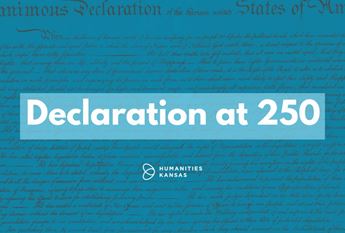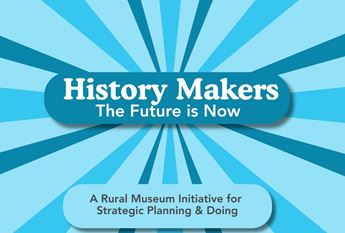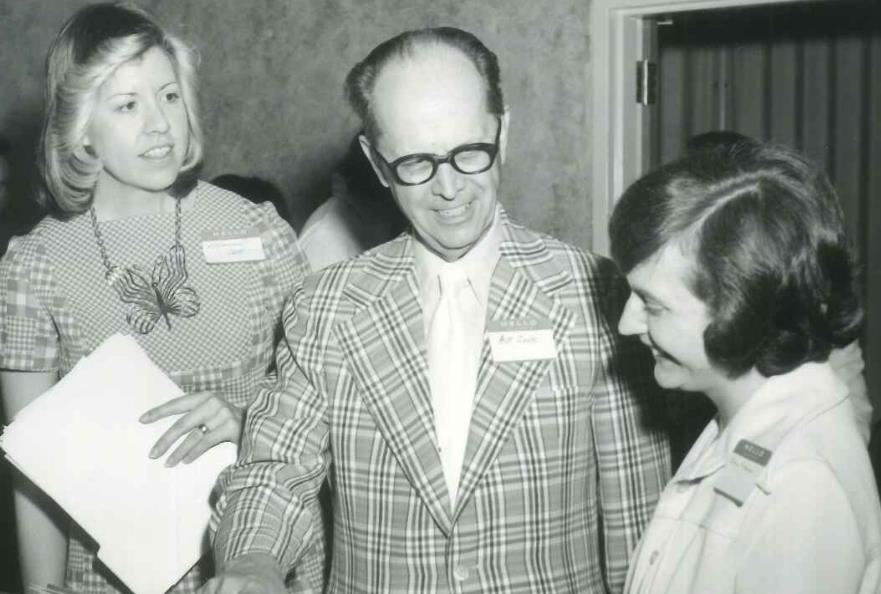

Back to '72 in '22
January 12, 2022
The year is 1972. The Equal Rights Amendment passes in Kansas, native son Gordon Parks releases the sequel to his hit 1971 film Shaft, and astronaut Kansan Ron Evans returns from a trip to the moon. These stories and more are part of Kansas 1972, a new podcast celebrating the 50th anniversary of Humanities Kansas and the dynamic year when it happened.
For 50 years, Humanities Kansas has been engaging Kansans in conversations about the world around us and pioneering programming, grants, and partnerships that explore the diverse Kansas stories.
The Kansas 1972 podcast is a 21st century way of continuing this work. Tracy Quillin, associate director for Humanities Kansas, shared that “the podcast will look at the year 1972, explore what was happening in our state, and the topics that were on Kansans’ minds.” The first episode is available now.
Kara Heitz, an historian with the Kansas City Art Institute in Kansas City and a podcast producer, is the producer of the Kansas 1972 podcast. In addition to the HK podcast, she and her associate Emily Milner are producing the Pandemic on the Prairie podcast that examines the 1918 flu pandemic and its effects on Kansas.
“We spent the summer researching 1972 in Kansas… browsing front page headlines, meeting with other Kansas historians, artists, and popular culture experts and discovering what was going on in the state, “ Heitz shared. With the knowledge of what was happening at the national level, Heitz looked for the Kansas connections. “We went back and forth to refine the topics, “ she commented. It took time to find the local stories that brought the topics to life. “We went through a lot of revisions,” Heitz said.
“1972 was an important year for Kansas,” added Julie Mulvihill, executive director of Humanities Kansas. “There were a lot of changes to the way things had always been done and Kansans looked to the newly formed Kansas Committee for the Humanities (now HK) for opportunities to talk it through. At its core from the very start was this question — what does it mean to be a Kansan and how does this change over time and across generations?”
The podcast’s first episode, From a Seed Ideas Grow, takes a look at the history of the National Endowment for the Humanities and the state humanities councils, including the Kansas Committee for the Humanities. That was the group’s name when it was founded in 1972; it changed to the Kansas Humanities Council in 1992, and, in 2018, the name was changed again to Humanities Kansas.
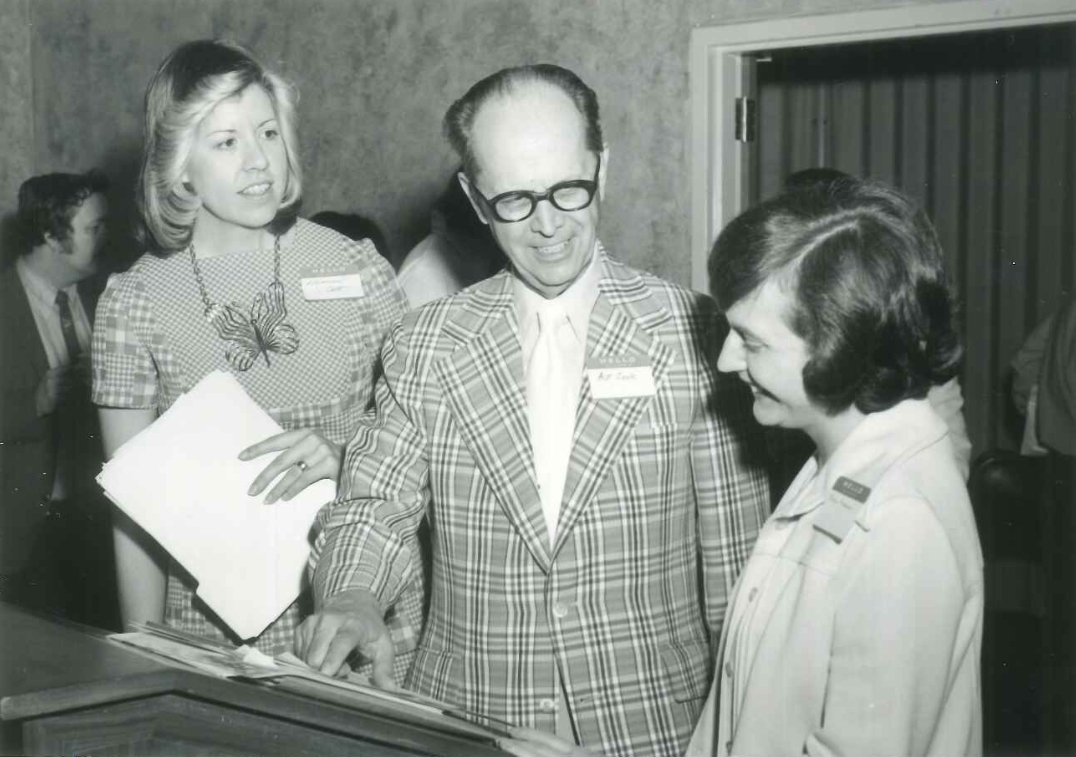
Marion Cott, Executive Director of the Kansas Committee for the Humanities, and Dr. D. Arthur Zook, Chair of the KCH Board of Directors, with Dr. Roberta Gladoski, NEH liaison to the KCH, 1975.
The upcoming Women on the Move episode focuses on the Equal Rights Amendment and Heitz calls it the most complicated. “We did eight separate interviews, and I have so much archival audio from Phyllis Schlafly and Shirley Chisholm, both of whom visited Kansas a number of times in the 1970s.” Schlafly led the opposition to the ERA through a unique-to-the-time grassroots effort that organized writing campaigns around certain talking points. During the 1972 national election, Chisholm was the first African American woman to run for president.
Kansas was the seventh state to ratify the Equal Rights Amendment. Quillin said, “It’s interesting to me to find out that Kansas ratified the ERA without fanfare or much opposition. It was a bipartisan effort that easily passed. An attempt was made a few years later to rescind the ERA’s passage, but it failed.”
Kansans were interested in this topic in 1972, and Saint Mary College in Leavenworth received one of the first Kansas Committee for the Humanities grant for “Equal Rights for Women,” a project that examined how the role of Kansas women evolved in a changing economy through the lens of history, literature, sociology, and religion. The Garden City Committee for the Humanities hosted “The Changing Social Role of Women” with the support of a KCH grant in 1975.
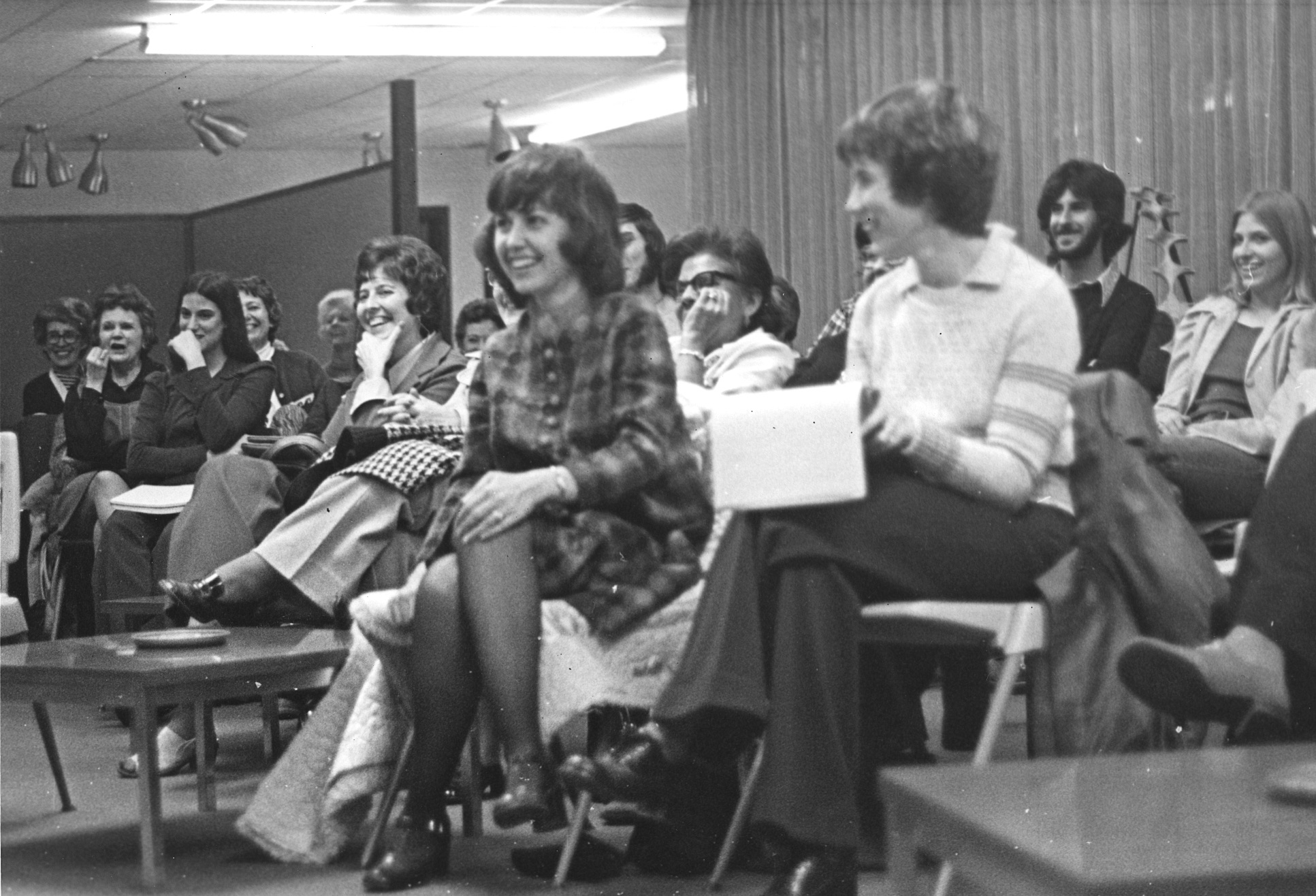
"The Changing Social Role of Women," Garden City, 1975.
Another upcoming episode, Kansas Through the Camera’s Eye, focuses on Gordon Parks, a well-known photographer of the time and a Fort Scott native who directed the 1971 release of “Shaft” starring Richard Roundtree and its 1972 sequel, “Shaft’s Big Score.” The episode also looks at the works of photographer Terry Evans who documented poverty and changing rural communities in Kansas in the 1970s with the support of a KCH grant. Like many important topics from 1972, exploring diversity and inclusion in Kansas became popular requests for funding support to the KCH.
In discovering new facts about the state, both Heitz and Quillin pointed to another episode To The Stars! In 1972, NASA was considering placing a new shuttle launch facility in western Kansas, the state was a hotspot for UFO sightings in the early 1970s, and Kansan Ron Evans was part of the Apollo 17 crew, the last manned mission to the moon in December 1972. “The space race presented exciting possibilities, but it also represented rapid change,” observed Quillin. “The theme of ‘change’ and ‘transition’ are explored in many of the early grant projects. Would this change impact their communities, businesses, and farms? What happened if federal sites – like a shuttle launch facility – came to Kansas? KCH grants made it possible for communities to come together and discuss these concerns. These grassroots discussions are still going strong 50 years later.”
Join the Movement of Ideas
- LISTEN to Episode 1 on humanitieskansas.org and subscribe to the Kansas 1972 podcast available on podcast apps and content providers. The 10 episodes will be released once a month throughout the year.
- EXPLORE the Generations of Ideas timeline on HK’s website. Journey through 50 years of innovative community programs created for Kansans by Kansans.
- CELEBRATE HK’s 50th all year long. Follow HK on social media for updates on pop-up events around the state and a wealth of social media posts about the organization and its 50-year legacy.
- SHARE your HK stories. The past 50 years would not have been possible without you! HK wants to hear your stories and see your photos dating back to 1972. It could be a tale from the Chautauqua tent, a photo of a Museum on Main Street opening, memories from travel for TALK or Speakers Bureau, or reflections on your experiences as a board member or project direct. Send your photos and stories to Tracy Quillin, HK associate director.


